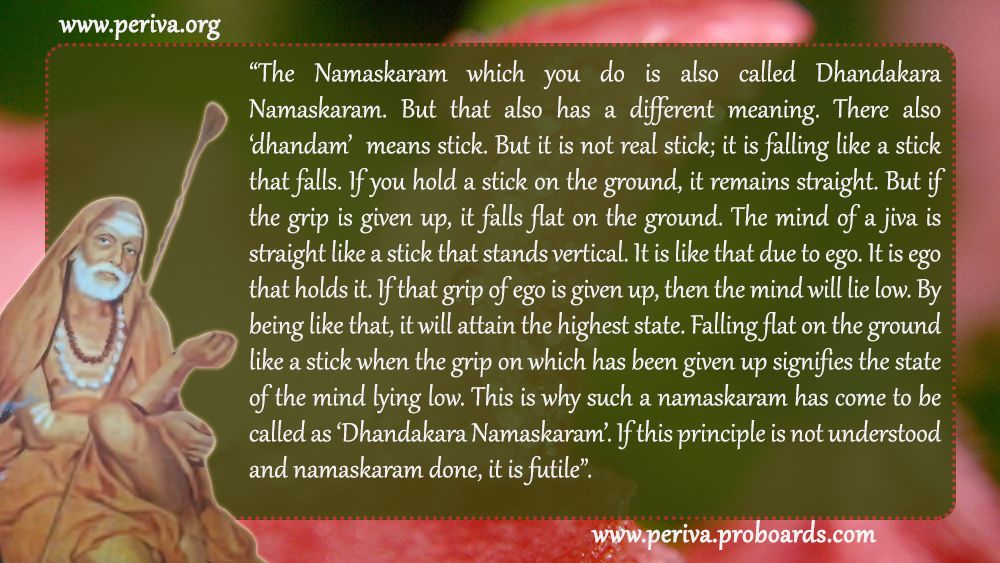நந்தனார்: உண்மையை வென்ற கற்பனை
நந்தனார்: உண்மையை வென்ற கற்பனை
நந்தனார் கதை தெரிந்த எல்லோரும் அவர் ஒரு ஈவிரக்கமில்லாத பிராம்மணர் பண்ணையாரிடம் படாதபாடுபட்டவர் என்று தீர்மானமாக நினைத்துக் கொண்டிருப்பீர்கள். ஆனால் வாஸ்தவத்தில் அறுபத்து மூவர் சரித்திரங்களுக்கு அதாரிட்டியான பெரிய புராணத்தில் வருகிற நந்தனார் கதையில் அந்த வேதியர் பாத்திரமே கிடையாது.
பெரிய புராணத்தில் திருநாளைப் போவார் நாயனார் புராணம் என்ற தலைப்பில் வருகிற நந்தனாருடைய கதையைப் பார்த்தாலே தெரியும். அவர் எந்தப் பண்ணையாரிடமும் சேவகம் பண்ணியவரில்லை. தத்தம் குலாச்சாரப்படி தொழில் செய்யும் எல்லா ஜாதிக்காரர்களுக்குமே அந்தக் காலத்தில் ராஜமான்யமாக நிலம் சாசனம் செய்யப்பட்டிருக்கும்.
நன்றாக எல்லை கட்டிய அந்த நிலத்துக்குத் துடவை என்று பெயர். அப்படிப்பட்ட பறைத் துடவையை நந்தனாரும் பெற்றுத் தம்முடைய சொந்த நிலத்தில் பயிரிட்டு வந்ததாகத்தான் பெரிய புராணத்தில் வருகிறது. இவரோ பிறந்ததிலிருந்து மறந்தும் சிவ சிந்தனை தவிர வேறே இல்லாதவர் என்று சேக்கிழார் சொல்லியிருக்கிறார். க்ஷேத்திரம் க்ஷேத்திரமாகப் போய்க்கொண்டே அவர் சிவத்தொண்டு செய்துவந்ததாகத்தான் மூல நூலான பெரிய புராணத்திலிருக்கிறதே தவிர ஒரு கொடுங்கோல் பிராம்மணரிடம் அடிமைப்பட்டு ஒரே இடத்தில் கட்டிப் போட்டாற்போலக் கிடந்தாரென்று இல்லை.
கொடுங்கோல் பிராம்மணர்களை சிருஷ்டி பண்ணியதும் ஒரு பிராம்மணர்தான். போன நூற்றாண்டில் இருந்த கோபாலகிருஷ்ண பாரதி என்கிற பெரியவர். நம்முடைய மதிப்பு மரியாதைக்குரிய பெரியவர். சிவ பக்தியில் ஊறியவர். கேட்கிற எவருடைய நெஞ்சத்தையும் அந்த பக்தியில் கரைக்கும்படியான உசந்த பாட்டுகள் கவனம் செய்தவர். கடைசிவரை பிரம்மச்சாரியாகவே வாழ்ந்து மஹா சிவராத்திரி புண்யகாலத்தில் சுவாமியோடு கலந்து விட்டவர். அவர் ஏழை எளியவர்களிடம் ரொம்பவும் இளகின சுபாவத்துடன் இருந்திருக்கிறார். அதோடு நல்ல நாடக உணர்ச்சி, உணர்ச்சியைப் பாராட்டித் தரும் சாமர்த்தியம் எல்லாமும் படைத்தவராக இருந்திருக்கிறார்.
அவர் நாளில் அந்தச் சீமையில் மிராஸ் பண்ணும் பிராம்மணர்களில் ஒருத்தர் இரண்டு பேர் உழவு செய்யும் ஆள்காரர்களை ரொம்பவும் கொடுமைப்படுத்தியதையும், அப்படியும் அந்த எளிய ஜனங்கள் எதிர்த்துச் சண்டை போடாமல், இப்படித்தான் நம் ஜன்மா என்று சகித்துக்கொண்டு இருந்து வந்ததையும் அவர் பார்த்தார். ஏற்கெனவே அவருக்கு எந்த ஜாதியரானாலும் பக்திச் செல்வத்தைக் குறைவறப் பெற்று ஈச்வரனுடனேயே இரண்டறக் கலக்கும் உன்னத நிலைவரை போய்விட முடியும் என்று காட்டும் திருநாளைப்போவார் சரித்திரத்தில் தனியான ஈடுபாடு இருந்திருக்கிறது.
அந்த நினைப்பும் அவர் நேரில் கண்ட நிலவரமும் அவருடைய நாடகத் திறமையில் ஒன்றாகச் சேர்ந்து வேதியர் பாத்திரத்தை சிருஷ்டிக்கப் பண்ணிவிட்டது. பறைத் துடவை பெற்றிருந்த நந்தனாரை அந்த வேதியரின் கூலியாளாக ஆக்கி அவரிடம் கொடுமைப்படுவதாகக் கதையை அழகாக ஜோடித்து மேலே மேலே சீன்களைக் கற்பனைப் பண்ணி நந்தன் சரித்திரக் கீர்த்தனையாகப் பாட வைத்து விட்டது.
அப்புறம் கதாகாலஷேபக்காரர்கள், காந்தீய தேசாபிமானிகள் எல்லோரும் அதை விசேஷமாக பிராபல்யப்படுத்தியதில் மூலமான பெரிய புராணத்துத் திருநாளைப்போவார் கதையே எடுபட்டுப்போய் இதுதான் நந்தனார் கதை என்றே ஆகியிருக்கிறது. இதை பார்ப்பவன், கொடுங்கோல் என்று வசைமாரி பாடுகிறவர்கள். இதோ பாருங்கள், ஒரு ஐயரே கொடுக்கும் ப்ரூஃப் என்று காட்டுவதில் கொண்டுவிட்டிருக்கிறது.
அந்தக் காலத்தில் மகா வித்வான் மீனாக்ஷி சுந்தரம் பிள்ளை தமிழறிஞர்களில் முக்கியமான ஸ்தானம் வகித்தவர். அவர் பிராம்மணரில்லை. ஆனாலும் குறுகிய ஜாதி நோக்கில் பார்க்காமல் நடுநிலையாகப் பார்த்தார். பார்த்து, என்னதான் கல்பனா சக்தி. எளிய ஜனங்களிடம் அநுதாபம் இருந்தாலும் இப்படி ஒரு மூலக் கதையை மாற்றியிருப்பது சரியில்லை எனறு முடிவு பண்ணிவிட்டார். விஷயம் தெரியாமல் அவரிடமே சிறப்புப் பாயிரம் வாங்கவேண்டுமென்று கோபால கிருஷ்ண பாரதி போனார்.
வீடுதேடி வந்த பிராம்மணரிடம் தப்பெடுக்க வேண்டாமென்று நினைத்து, நீங்கள் இதை முக்கியமாக சங்கீத நாடக பாணியில் அமைத்திருக்கிறீர்கள். எனக்கோ சங்கீதம் பிடிக்காது. தமிழ்ப் புலமை, சிவ பக்தி ஆகியவற்றோடு நல்ல சங்கீத வித்வத்துவம் உள்ள எவரிடமாவது நீங்கள் பாயிரம் வாங்குவதுதான் பொருத்தம் என்று சொல்லி அனுப்பிவிட்டார். ஆனாலும் தம்மிடம் தமிழ் கற்றுக் கொண்டிருந்த உ.வே. சுவாமிநாதையர் போன்றவர்களிடம் மனசில் இருந்ததைச் சொன்னார். அதனால்தான் இப்போது உங்களுக்கு நான் இந்தக் கதை சொல்ல முடிகிறது.
அப்போதைக்கு பாரதி திரும்பிப் போனாலும் மறுபடியும் வந்தார். பண்டித, பாமர ரஞ்ஜகமாக நீங்கள் எழுதியிருக்கிற இந்த நூல் தானே பிரசித்தி அடையும். என் பாயிரம் அவசியமேயில்லை என்று சொல்லிப் பிள்ளை அவரை அப்போதும் திருப்பியனுப்பி விட்டார்.
இப்படி பாரதி பல தடவை நடையாக நடந்து பிறகு ஒரு தடவை நடுமத்தியான வேளையில் வந்தார். அப்போது வீட்டுக்குள்ளே பிள்ளை சிரம பரிகாரம் பண்ணிக் கொண்டிருக்கிறாரென்று தெரிந்தது. அவர் எழுந்திருந்து வருகிறபோது வரட்டும் என்று வாசல் திண்ணையில் பாரதி உட்கார்ந்து விட்டார். உட்கார்ந்தவர் தன்னையறியாமல் நந்தன் சரித்திர கீர்த்தனைகள் பாட ஆரம்பித்தார்.
உள்ளே அரைத் தூக்கமாயிருந்த பிள்ளையின் காதில் பக்தி பாவம், ராக பாவம் இரண்டும் பூர்ணமாக இருந்த அந்தப் பாட்டுக்கள் விழுந்ததால் அவரும் அதில் ஆகர்ஷணமாகிவிட்டார். அந்தப் பாட்டுகளில் இலக்கணப் பிழைகள் வழு என்பது இருப்பதாகவும் ஏற்கெனவே அவருக்கு இரண்டாவது குறை. இப்போது, பாடியவருடைய பக்திப் பிரவாகத்தில் அந்த வழுவெல்லாங்கூட அடித்துக்கொண்டு போய்விட்டாற்போலத் தோன்றிற்று. அந்த பிரவாகத்தைத் தடைப்படுத்த வேண்டாமென்றே, அவர் தொடர்ந்து தூங்குகிற மாதிரி இருந்து கேட்டுக் கொண்டிருந்தார். வருகலாமோ? என்ற பாட்டுக்கு பாரதி வந்தார்.
ஏற்கெனவே அந்த வார்த்தையை இலக்கண சுத்தமில்லை என்று பிள்ளை கண்டித்திருக்கிறார். வருகை, போகை என்று உண்டு. வருதல், போதல் என்றும் உண்டு. அவை இலக்கண சுத்தமான பிரயோகங்கள். இரண்டுமில்லாமல் இதென்ன வருகல்?ஆரம்ப வார்த்தையே சரியாயில்லையே. வரலாமோ? என்றாலே சரியாயிருக்குமே என்று சொல்லியிருக்கிறாராம்.
ஆனால் இப்போது நந்தனார் தூரத்திலிருந்து சிதம்பரம் கோவிலை தரிசனம் பண்ணி, ஒரு பக்கம் பக்தியிலே தாபமான தாபம். இன்னொரு பக்கம் தன்னுடைய பிறவியை நினைத்துத் தயக்கமான தயக்கத்தோடு கண்ணுக்குத் தெரியாத நடராஜாவை மனக் கண்ணால் பிடித்து நிறுத்தி வைத்து, கண்ணுக்குத் தெரியும் அந்த சந்நிதானத்துக்குத் தானும் வரலாமா, வரலாமா என்று என்றைக்கோ உருகி உருகிக் கேட்டதை, அதே தாபத்தோடு பாரதி உருக்கமாகப் பாடிக் கேட்டவுடன் மீனாக்ஷி சுந்தரம் பிள்ளைக்கு இலக்கணப்பிழை, திருமுறையை மாற்றிய பிழை எல்லாம் மறந்து போய்விட்டதாம்.
இப்பேர்ப்பட்ட பக்த சிகாமணி நாம் திரும்பத் திரும்ப விரட்டியடித்தும் பாயிரத்துக்காக வருகலாமோ? என்று நம்மிடமே கேட்பதுபோல் பண்ணி விட்டோமே என்று ரொம்பவும் பச்சாத்தாபப்பட்டுக் கொண்டு வாசலுக்கு ஒடி வந்தாராம். வருகலாமோ அவரையும் வரவழைத்து விட்டது. அவரிடமிருந்து பாயிரத்தையும் வரவழைத்துவிட்டது.
தெய்வத்தின் குரல் (ஆறாம் பகுதி)
????????: ??????? ????? ?????? - ?? ?????






